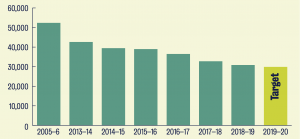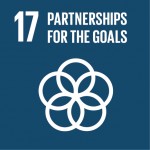This blog is the first in a series of four posts on Sustainability Month 2021.
This year, our annual Sustainability Week became Sustainability Month. This month presented an opportunity to come together as a community, to collaborate and to build a more progressive and positive future at King’s and beyond.
Focusing on how to ‘#MakeADifference’ and ‘#TakeAction,’ a range of events were organised by the King’s Sustainability Team in collaboration with students, societies, charities and staff Sustainability Champions.
Although the format of the events was a little different due to being hosted online, we had the pleasure of welcoming a total of 898 people – new and returning – to take part in the exciting range of events. We hope you enjoyed it as much as we did!
Here’s a summary of some of the events we had throughout the month, along with ways you can #MakeADifference and #TakeAction…
SUSTAINABILITY AT KING’S 101
How is King’s tackling climate change and embedding sustainability throughout its operations?
King’s is working on a range of sustainability goals – from enhancing biodiversity and reducing our carbon footprint to supporting sustainable transport and embedding sustainability in teaching and research.
Key achievements include:
- Reduced our scope 1 and 2 carbon emissions by 54% compared to our 2005/06 baseline, exceeding our previous target to reduce emissions by 43% by 2020.
- Improved waste recycling rates to 70%.
- 70 Sustainability Champions teams submitted work to make their department more sustainable (from Social Mobility & Student Success, Cardiology Labs, Geography, Dickson Poon School of Law, to the Centre for Stem Cells and Regenerative Medicine).
- Established the King’s Climate Action Network (CAN) – an open, interdisciplinary forum for students, staff and alumni with 7 sub-groups working towards a strategy to achieve our net–zero carbon target by 2025.
- King’s was awarded 9th in the world for Social Impact in the THE Rankings.
- King’s has now fully divested from fossil fuels ahead of target (target was set at 2022).
- All electricity from King’s is renewable (from wind power).
Take a look at the 2018-2019 Environmental Sustainability Report to find out more about our achievements and goals.
There are lots of ways for you to get involved, from joining King’s CAN or your department’s Sustainability Champions team, to writing a piece for our blog or volunteering as a Sustainability Auditor (we’ll share more information about this opportunity in April).
GIKI ZERO: CUT A TONNE IN ‘21
Have you ever wondered what your impact on the earth is and how you can cut your carbon footprint?
At this event, we had the pleasure of welcoming Jo Hand, creator of Giki Apps. Giki – which stands for “Get Informed, Know your Impact” – have developed two wonderful tools to help individuals, like you and me, to reduce their carbon footprint.
Firstly, Giki Zero allows you to calculate your carbon footprint by measuring your everyday actions and consumption. You are then presented with accessible and doable action items – from talking about climate change with your friends and contacting your local MP to buying secondhand clothing and eating seasonal fruit and veggies – so you can cut a tonne in ’21!
The second tool is an app, Giki, that allows consumers to assess the environmental impact of a product simply by scanning its barcode. Products are assessed against 13 indicators and awarded badges based on how well they perform, helping you to navigate the overwhelming and confusing world of sustainable consumption.
We invite you to calculate your carbon footprint and commit to 2 or 3 actions over the next month!
Recordings of the events can now be found on our Kaltura.
If you’d like to stay in touch, sign up for our monthly newsletter and follow us on Instagram, Facebook or Twitter.




 and qualitative measures developed at the GCSO institutions. This way, universities can ensure that operations and users of buildings do not experience any negative impacts as a result of the “experiment”.
and qualitative measures developed at the GCSO institutions. This way, universities can ensure that operations and users of buildings do not experience any negative impacts as a result of the “experiment”.
